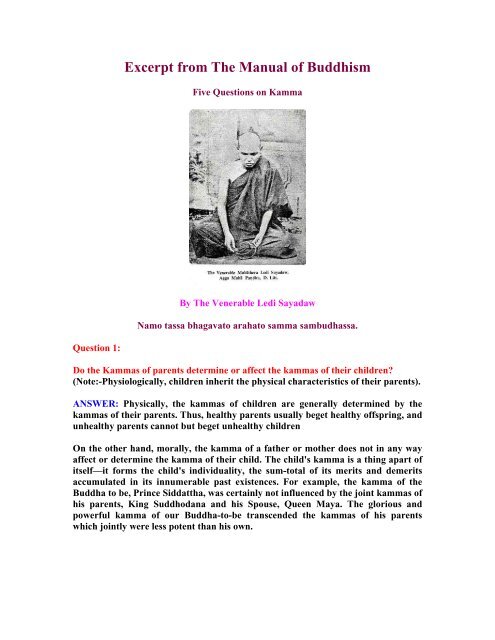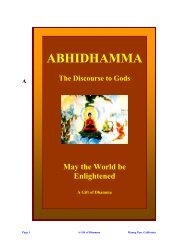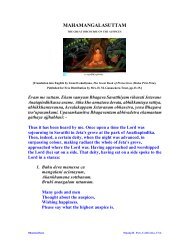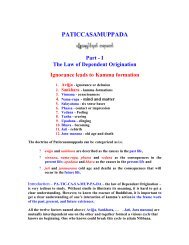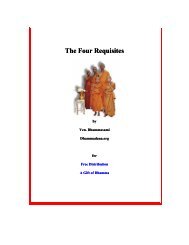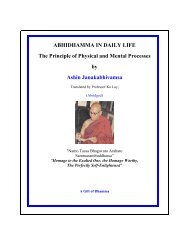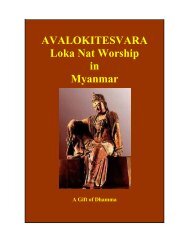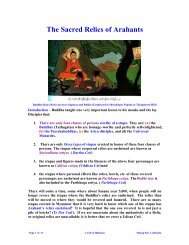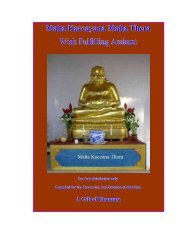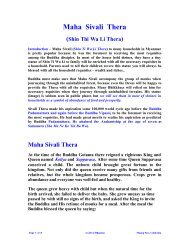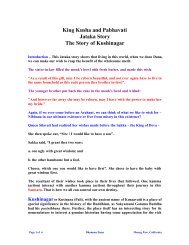Five Questions on Kamma.pdf
Five Questions on Kamma.pdf
Five Questions on Kamma.pdf
Create successful ePaper yourself
Turn your PDF publications into a flip-book with our unique Google optimized e-Paper software.
Questi<strong>on</strong> 1:<br />
Excerpt from The Manual of Buddhism<br />
<str<strong>on</strong>g>Five</str<strong>on</strong>g> <str<strong>on</strong>g>Questi<strong>on</strong>s</str<strong>on</strong>g> <strong>on</strong> <strong>Kamma</strong><br />
By The Venerable Ledi Sayadaw<br />
Namo tassa bhagavato arahato samma sambudhassa.<br />
Do the <strong>Kamma</strong>s of parents determine or affect the kammas of their children?<br />
(Note:-Physiologically, children inherit the physical characteristics of their parents).<br />
ANSWER: Physically, the kammas of children are generally determined by the<br />
kammas of their parents. Thus, healthy parents usually beget healthy offspring, and<br />
unhealthy parents cannot but beget unhealthy children<br />
On the other hand, morally, the kamma of a father or mother does not in any way<br />
affect or determine the kamma of their child. The child's kamma is a thing apart of<br />
itself—it forms the child's individuality, the sum-total of its merits and demerits<br />
accumulated in its innumerable past existences. For example, the kamma of the<br />
Buddha to be, Prince Siddattha, was certainly not influenced by the joint kammas of<br />
his parents, King Suddhodana and his Spouse, Queen Maya. The glorious and<br />
powerful kamma of our Buddha-to-be transcended the kammas of his parents<br />
which jointly were less potent than his own.
Questi<strong>on</strong> 2:<br />
If the kammas of parents do not influence those of their children, how would the<br />
fact be explained that parents who suffer from certain virulent diseases are apt to<br />
transmit these evils to their offspring?<br />
ANSWER: Where a child inherits such a disease it is due to the force of the parent's<br />
characteristics because of the force of the latter's utu (c<strong>on</strong>diti<strong>on</strong>s favorable to<br />
germinati<strong>on</strong>). Take, for example, two seeds from a sapling plant <strong>on</strong>e in inferior, dry<br />
soil; and the other in rich, moist soil. The result, we will find, is that the first seed<br />
will sprout into a sickly sapling and so<strong>on</strong> show symptoms of disease and decay while<br />
the other seed will thrive and flourish, and grow up to be a tall, healthy tree<br />
It will be observed that the pair of seeds taken from the same stock grows up<br />
differently according to the soil into which they are put. A child's past kamma (to<br />
take the case of human beings) may be compared to the seed; the physical<br />
dispositi<strong>on</strong> of the mother to the soil; and that of the father to the moisture which<br />
fertilizes the soil.<br />
It will be seen that, although a child's kamma be very powerful in itself, it cannot<br />
remain wholly uninfluenced by those of its parents. It is apt to inherit the physical<br />
characteristics of its parents yet, it may occur that the child's kamma, being<br />
superlatively powerful, the influence of the parent’s joint kammas cannot<br />
overshadow it.<br />
All beings born of sexual cohabitati<strong>on</strong> are the resultant effects of three forces—-<br />
<strong>on</strong>e, the old kamma of past existences. The next is the characteristic of the mother,<br />
and the third, the characteristic of the father. The physical dispositi<strong>on</strong>s of the<br />
parents may or may not be equal in force. One may counteract the other to a lesser<br />
or greater extent. The child's kamma and physical characteristics such as race,<br />
color, etc., will be the product of the three forces<br />
Questi<strong>on</strong> 3:<br />
On the death of a sentient being, is there a 'soul' that wanders about at will?<br />
ANSWER: When a sentient being leaves <strong>on</strong>e existence, it is reborn either as a<br />
human being, a Deva, a Brahma, an inferior animal, or as a denizen of <strong>on</strong>e of the<br />
regi<strong>on</strong>s of hell. The skeptics and the ignorant people hold that there are<br />
intermediate stages--- Antarabhava--- between these; and that there are beings who<br />
are neither of the human, the Deva or the Brahma worlds, nor of any <strong>on</strong>e of the<br />
states of existences recognized in the Scriptures,--- but are in an intermediate stage.<br />
Some assert that these transiti<strong>on</strong>al beings are possessed of the five khandhas:<br />
Some assert that these beings are detached 'souls' or spirits with no material<br />
envelopes and some said that they are possessed of the faculty of seeing like Devas.<br />
Page 2 of 6 A Gift of Dhamma Maung Paw, California
This belief in intermediate stages between existences is false, and is c<strong>on</strong>demned in<br />
the Buddhist teachings. A human being in this life who by his <strong>Kamma</strong> is destined to<br />
be a human being in the next will be re-born as such; <strong>on</strong>e who by his <strong>Kamma</strong> is<br />
destined to be a deva in the next will appear in the land of devas , and <strong>on</strong>e whose<br />
future life is to be in hell, will be found in <strong>on</strong>e of the regi<strong>on</strong>s of hell in the next<br />
existence.<br />
For example, a human being dies and is reborn in the land of devas. Though these<br />
two existences are different, yet the link or c<strong>on</strong>tinuity between the two at death is<br />
unbroken in point of time. So in the case of a man whose future existence is to be the<br />
hell, the distance between hell and the abode of man appears to be great. Yet, in<br />
point of time, the c<strong>on</strong>tinuity of “passage " from the <strong>on</strong>e existence to the other is<br />
unbroken, and no intervening matter or space can interrupt the trend of this man's<br />
kamma from the world of human beings to the regi<strong>on</strong>s of hell. The "passage" from<br />
<strong>on</strong>e existence to another is instantaneous, and the transiti<strong>on</strong> is infinitely quicker<br />
than the blink of an eyelid or a lightning-flash.<br />
<strong>Kamma</strong> determines the realm of rebirth and the state of existence in such realm of<br />
all transient beings (in the cycle of existences which have to be traversed till the<br />
attainment at last of Nibbana)<br />
<strong>Kamma</strong>s in their results are manifold, and may be affected in many ways. Religious<br />
offerings (Dana) may obtain for a man the privilege of rebirth as a human being, or<br />
as a deva, in <strong>on</strong>e of the six deva-worlds according to the degree of the merit of the<br />
deeds performed and with the observance of religious duties (sila).<br />
For those who practice the five jhanas or states of enlightenment will go to the<br />
Brahma worlds or Brahma-lokas up to the summit, the twentieth Brahma world.<br />
Those with bad deeds are to be found in the lowest depths of the hell. Thus, our<br />
kammas, past, present and future, were, are, and will ever be the sum-total of our<br />
deeds, good, indifferent or bad, according as our acti<strong>on</strong>s are good, indifferent or<br />
bad, as will be seen from the foregoing, our kammas determine the changes in our<br />
existences.<br />
"Evil spirits" are therefore not beings in an intermediate or transiti<strong>on</strong>al stage of<br />
existence, but are really very inferior beings, and they bel<strong>on</strong>g to the world of Petas.<br />
They are very near the world of human beings. As their c<strong>on</strong>diti<strong>on</strong> is unhappy, they<br />
are popularly c<strong>on</strong>sidered as evil spirits. It is not true that all who die in this world<br />
are reborn as evil spirits, though human beings who die sudden or violent deaths are<br />
reborn in these lowest worlds as terrestrial spirit.<br />
Questi<strong>on</strong> 4:<br />
Page 3 of 6 A Gift of Dhamma Maung Paw, California
Is there such a thing as a human being who is reborn and who is able to speak<br />
accurately of his or her past existence?<br />
ANSWER: Certainly, this is not an uncomm<strong>on</strong> occurrence, and is in accordance<br />
with the tenets of Buddhism in respect to kamma. Such a pers<strong>on</strong> is called a jatisara<br />
puggalo from jati, existence, sara, remembering and puggalo, rati<strong>on</strong>al being.<br />
The followings (who form an overwhelming majority of human beings) are unable<br />
to remember their past existences if, and when reborn as human beings.<br />
1. Children who die young.<br />
2. Those who die old and senile.<br />
3. Those who are str<strong>on</strong>gly addicted to the drug or drink habit.<br />
4. Those whose mothers, during their c<strong>on</strong>cepti<strong>on</strong>, have been sickly or have had<br />
to toil laboriously, or have been reckless or imprudent during pregnancy.<br />
The children in the womb being stunned and startled lose all knowledge of<br />
their past existences.<br />
The following are possessed of knowledge of their past existences. viz:—<br />
1. Those who are not re-born (in the human world) but proceed to the<br />
world of devas, of Brahmas, or to the regi<strong>on</strong>s of hell, remember their<br />
past existences.<br />
2. Those who die sudden deaths from accidents, while in sound health<br />
may also be possessed of this faculty in the next existence, provided<br />
that the mothers, in whose wombs they are c<strong>on</strong>ceived, are healthy,<br />
clean-lived and quiet women.<br />
3. Again, those who live steady, meritorious lives and who (in their past<br />
existences) have striven to attain, and have prayed for this faculty<br />
often attains it.<br />
Lastly, the Buddha, the Arahants and Ariyas attain this gift which is known as<br />
pubbenivasa-abhinnana.<br />
Questi<strong>on</strong> 5:<br />
Which are the five Abbhinnana? Are they attainable <strong>on</strong>ly by the Buddha?<br />
ANSWER: The five Abhinnana (Psychic powers) (Pali Abhi=excelling;<br />
nana=wisdom) are:<br />
1. Iddhividha, Creative power,<br />
2. Dibbasota, Divine Ear;<br />
3. Cittapariya-nana, Knowledge of others' thoughts,<br />
4. Pubbenivasanussati; Knowledge of <strong>on</strong>e's past existences; and<br />
Page 4 of 6 A Gift of Dhamma Maung Paw, California
Dibbacakkhu, The Divine eye.<br />
The five Abhinnana are attainable also by Arahants and Ariyas and not <strong>on</strong>ly the<br />
above, but by ordinary mortals who practice according to the Scriptures; as was the<br />
case with the hermits, etc., who flourished before the time of the Buddha and who<br />
were able to fly through the air and traverse different worlds.<br />
In the Buddhist Scriptures we find, clearly shown, the means of attaining the five<br />
abhinnana ; and even now-a-days, if these means are carefully and perseveringly<br />
pursued, it would be possible to attain these. That we do not see any pers<strong>on</strong><br />
endowed with the five abhinna today, is due to the lack of strenuous physical and<br />
mental exerti<strong>on</strong> towards their attainment.<br />
Page 5 of 6 A Gift of Dhamma Maung Paw, California
Page 6 of 6 A Gift of Dhamma Maung Paw, California


